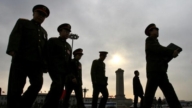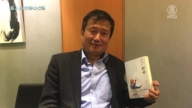【新唐人2014年10月25日訊】中共四中全會結束後所公布的《四中全會公報》,一再強調共產黨的領導地位,以及它和法治的一致性,引起輿論嘩然。外界普遍認為,《公報》內容與四中全會高調宣稱的「依法治國」背道而馳,是法制的大倒退,也使那些因為反腐而對中共產生的幻想,徹底破滅了。
這次的四中全會上,共產黨沒有暗示它將限制它自己的權力。相反,它說共產黨的領導是法治的「基本要求」。
而會後發佈的 《中共十八大四中全會公報》,一如既往的強調共產黨的領導,並說這和社會主義法治是一致的。
《公報》還說,中國憲法確立了中共的領導地位。四中全會則明確了所謂全面推進依法治國的重大任務,除了加強憲法實施、司法公正等,還要加強和改進中共在其中的領導等。
中國民主大學校長唐柏橋:「它這個表示是一種倒退,它到了79年以前去了。堅持黨的領導跟憲政是直接衝突的,和依法治國是直接對立的,世界上沒有一個憲政國家,它永遠在一個黨的領導下,這個黨沒有經過選舉。它這個時候還拿出來,也就是說它告訴世人,不要對它抱任何幻想,它要一條路走到黑。」
《公報》出來後,被稱為「中國法治三老」之一的李步雲,在接受媒體時說,依法治國的根本是依憲治國,而憲政的四個要素,包括人民民主、依法治國、保障人權,以及憲法需要有極大的權威。他認為,在當今中國,憲法的權威樹立不起來,根本原因是缺少制度保障。
李步雲披露,在1982年憲法起草過程中,他曾提出民主立憲和司法獨立,但中共高層擔心會威脅到中共的領導、和人大的監督,使得司法獨立沒有真正成行。99年和2004年修改憲法時,李步雲等人再次提出相關內容,還是沒有被接納。
李步雲還指出,辦具體案件時,黨要過問和干預,這是與憲法相違背的。應該是以法治來促人權、促民主,進而推動整個制度的改革。
「依法治國」在1979年作為理念被提出。前中共人大委員長,政法委書記喬石在主管政法委時,曾力推「依法治國」,最終使得1999年「依法治國」被寫入中共憲法。
然而,就在同一年,中國發生了一件大事,使得喬石等中共黨內的「開明派」,在這方面的嘗試終止了。
前中共黨魁江澤民,自1999年起,掀起了對信仰「真善忍」的法輪功群體的滅絕式鎮壓,使得法律變成一紙空文。憲法規定的信仰自由,言論自由成了空話。專門負責迫害法輪功的「6‧10」辦公室,凌駕於公、檢、法、司之上,政法委書記的職權空前擴大。從此「依法治國」又被擱置起來。
在中共現任總書記習近平上臺後,再次多次提及「法治」,「將權力關進籠子」,以及「共產黨也要遵守憲法」等說法。剛剛結束的四中全會也號稱「依法治國」。那為甚麼四中全會的結果給外界的感觀,卻和真正的「法治」背道而馳呢?
大陸時政評論員陳明慧:「江系利用了黨內的各種資源,還有他們黨內的一個底線—保持紅色的江山不變,他(習)又是體制的黨魁,這個問題他沒法逾越,如果說他要突破這個瓶頸,他必須要放棄這個體制,解散這個政黨,他才有可能真正能做到依法治國,法治夢,中國夢。否則的話這種可能性是不存在的。」
唐柏橋:「有很多人仍然對它抱幻想,所以很多人又被共產黨騙了,等著它來改革,但是現在很多人希望又破滅了,有些人就認命了,我身為中國人,下輩子不做中國人了,還有些人說,我要奮起抗爭了,想辦法改變中國命運。」
中國社會問題研究人士張健指出,習近平本來希望通過打幾隻「大老虎」來挽回民眾對中共的希望,但這次《公報》更加讓百姓明白,中共已經沒有信用可言。
採訪編輯/劉惠 後製/李智遠
Fourth Plenum Ruins the Last Hopes
The Fourth Plenary Meeting message stressed, the Chinese Communist Party (CCP) should lead with the rule of law. It should set the blueprint for rule of law in China. This announcement was analyzed as contrary to the so-called “to rule by law" and a big setback to law and order. It completely broke the last hope for those who still believe in the CCP for the anti-graft campaign.
During the Fourth Plenary Session, the CCP did not restrict its authority but emphasized the CCP leadership; “The most fundamental guarantee" in its quest toward rule of law.
The message stressed the role of CCP rule and that the CCP leadership is consistent with the socialist rule of law.
It said, the CCP is defined by the Constitution as the country’s leader.It also said, the major tasks are to strengthen the implementation of the Constitution, to safeguard judicial justice, to sharpen the CCP’s leadership, and so on.
Democracy Academy of China President Tang Baiqiao said, “it is a step backwards to the time before 1979. Insistence on Party leadership is in direct conflict with the constitutional government, directly opposing the rule of law. No constitutional state in the world is under the one-party leadership without elections. Speaking of this now is telling people to give up any illusion about the CCP. This is a one way street."
In an interview, famous Chinese law professor Li Buyun told ifeng.com, “the rule of law is simply abide by Constitution; There are four elements in constitutionalism: democracy, the rule of law, human rights and authority of constitution." He believed that the authority of the Constitution in China is yet to be set up today for lack of institutional support.
Li Buyun revealed when drafting the constitution in 1982, he proposed democratic constitution and independent judiciary. For fear of threatening the CCP leadership and NPC supervision, the judiciary system was never independent. During the amendment of the constitution in 1999 and 2004, the relevant proposal was once again rejected.
Li Buyun also pointed out that party’s intervention in specific cases is contrary to the Constitution.It requires the rule of law to advance human rights, democracy, and the institutional reform.
The “Rule of law" was presented as an ideal in 1979. Former Politics and Law Committee secretary Qiao Shi hoped to introduce rule of law into the constitution in 1999.
However, in 1999, a major event took place in China and ended this attempt of Qiao Shi and other liberal members.
Former CCP leader Jiang Zemin initiated the extinction campaign against Falun Gong practitioners in 1999. Law has become a piece of paper. The freedom of belief, freedom of speech in the Constitution has become meaningless. The 610 Office responsible for carrying out the persecution of Falun Gong overrides the judiciary. The Political and Legal Committee enjoy unprecedented power. Since then, “rule of law" has been shelved.
Since Xi Jinping took over, he has spoken of “rule of law", “cage the power" and “CCP must abide by the Constitution" in multiple events, including the just-concluded Fourth Plenary session. But, why are people left with the opposite idea of the message about the rule of law?
Politics commentator Chen Minghui: “The Jiang’s faction has manipulated all sources in the CCP. The bottom line of the tyranny, as the leader of the party, there are barriers Xi Jinping will not be able to conquer. To break through this bottleneck, he must give up this system, dissolve the party. Otherwise, his dream of rule of law, or China dream will never come true."
Tang Baiqiao, “many people hold illusions about the CCP. They have been deceived by the CCP about the reform. Now their hope is shattered. Some people accept their fate and claim they won’t be Chinese next time, but others claim to strive for a change of the fate of China."
Chinese social issue researcher Zhang Jian pointed out that Xi Jinping had hoped to restore peoples’ belief in the CCP by hitting “tigers", but the message only further proved the CCP has lost its credibility to the people.
Interview & Edit/LiuHui Post-production/Li Zhiyuan



























